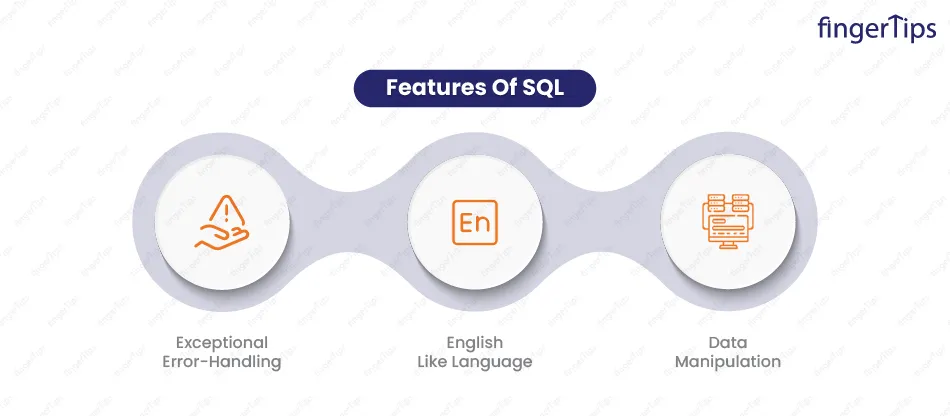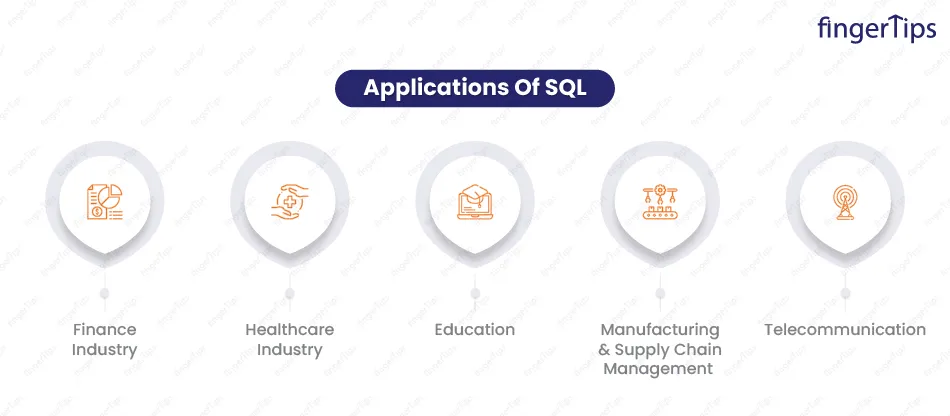The world we're living in generates enormous amounts of data. Earlier, when data was limited, it was stored in pages and files. Now, with increased data, we started storing it in laptops and PCs and then comes hard disks. And, now, when we need more space and management of data, the concept of cloud computing and database management systems has been introduced.
Almost every job related to the technical field, like data science, business analysis, etc., has to access data from the management system. And in this process, SQL plays an important role. So, in this blog, we'll be seeing What is SQL, what SQL can do, and most importantly, why you should use SQL. Let's begin with understanding what is SQL.
What Is SQL?
Database communication is done using a language called SQL, or Structured Query Language. Users can access, update, delete, and enter data into databases, among other actions. With SQL, you can communicate commands or questions to a database to obtain precise data.
For instance, you may inquire which products are in stock, update client data, or determine total sales. It is a crucial tool for managing and analyzing data, facilitating quick access, organization, and manipulation for developers. Anyone working with databases or data-driven applications needs to know SQL.
This was a basic introduction to SQL language. You'll learn more about the language by seeing the features of SQL.
Features Of SQL

A potent programming language created specifically for managing and modifying relational databases is called SQL (Structured Query Language). Key characteristics of SQL include:
Exceptional Error-Handling
SQL provides error management features like the TRY-CATCH block to handle exceptions while executing a query. The CATCH block collects mistakes as they happen and gently manages them, preventing query failures and enabling users to control the execution's flow and offer pertinent error messages or actions.
English - Like Language
Both technical and non-technical users will find SQL to be simple to comprehend and use because it is supposed to be an English-like language. Because its syntax resembles natural language, it enables users to express requests and instructions simply and intuitively without needing in-depth programming knowledge.
Data Manipulation
Users can enter, update, and delete data in relational databases using SQL's robust data manipulation features. They can add new entries, edit current data, or delete unnecessary data using commands like INSERT, UPDATE, and DELETE, ensuring data accuracy and relevancy.
Along with this, let's proceed to see SQL benefits in detail.
Supercharge your career with the ultimate Data Science Course with a Placement Guarantee
Benefits Of SQL

SQL programming language comes with multiple benefits. Some of them are:
Efficient & Fast
SQL is a quick and accurate programming language. It works very well in data collection as well as the manipulation process. The query process and multiple algorithms make the language fast for the users. The benefits of SQL help the user increase performance in multiple applications.
Minimum Coding Skill Required
One of the important SQL benefits is that the language requires minimum to no coding skills. The language is thus very popular among beginners. It allows users to express data commands without a proper programming language, which helps aspiring and beginner data analysts and other professionals.
Large Community
A sizable and vibrant community of programmers, database managers, and enthusiasts support SQL. This active community makes numerous online resources, forums, and tutorials possible. It makes it simpler for users to learn, debug, and keep current with the most recent advancements in SQL technology by offering information, help, and solutions for SQL-related difficulties.
Data Security
SQL offers strong data security features, such as encryption capabilities and access control techniques. Users' privileges can be controlled by administrators, preventing unauthorized access to critical information. The security features of SQL make it a secure alternative for data management by assisting in preventing data breaches, ensuring data privacy, and maintaining the integrity of the database.SQL is an essential tool for managing data and aiding data-driven decision-making due to its adaptability, effectiveness, and widespread industry usage. Now, before moving further, let's see some of the SQL application examples below.
Applications Of SQL

Due to its effectiveness in maintaining and analyzing relational databases, SQL (Structured Query Language) is widely used across many professions and sectors. Here are some instances of how SQL is applied in various fields:
Finance Industry
SQL is essential for managing and analyzing enormous financial data in finance. Transactional data, client data, and account information are all stored in SQL databases. Financial institutions can use it to produce reports, track and analyze financial activity, and offer efficient and secure banking services. SQL queries make real-time data retrieval for risk analysis, fraud detection, and compliance easier. In addition, SQL facilitates increasing financial decision-making processes in banking, investing, insurance, and other financial industries.
Healthcare Industry
SQL is utilized in the healthcare industry to maintain patient information, medical data, and research results. Electronic health records (EHR) are kept in SQL databases, enabling data retrieval for patient care, treatment planning, and scientific study. SQL is a vital tool for enhancing patient care and medical research in the healthcare sector because of its effective data processing and analytical capabilities that support healthcare analytics, guarantee data integrity, and comply with privacy laws.
Education
SQL is used in the field of education to manage student records, course data, and academic success. Data on enrollment, grades, and academic programs are kept in SQL databases. Data retrieval is made easier by SQL queries for academic research, student analysis, and institutional planning. This makes it possible for educational institutions to effectively manage student information, monitor academic achievement, and make data-driven choices that enhance administrative procedures and educational outcomes.
Manufacturing & Supply Chain Management
Inventory, orders, and production data are all managed via SQL in manufacturing and supply chain management. Supply chain logistics, production schedules, and material information are all stored in SQL databases. Track order status, evaluating manufacturing efficiency, and optimizing inventory levels are all made possible using SQL queries. This enables producers to optimize processes, cut costs, and guarantee prompt product delivery. The manufacturing sector's supply chain planning and execution depend heavily on SQL's data management capabilities.
Telecommunication
SQL is used in telecommunications to manage subscriber, billing, and network performance data. Customer profile's call history and network statistics are all stored in SQL databases. SQL queries make real-time data retrieval for billing and customer service, network performance measurement, and use monitoring possible. As a result, effective subscriber administration, billing procedures, and network optimization are made possible, guaranteeing clients of high-quality and dependable telecom services. The robust operations in the telecoms industry require SQL's data handling skills.
If, despite seeing features, benefits, and applications of SQL, you're wondering what SQL can do and why you should use SQL, we'll answer that, too.
Why You Should Use SQL
Because SQL is a strong and effective language for managing and manipulating relational databases, you ought to utilize it. SQL is the best choice for data management activities since it makes obtaining, editing, and deleting data simple. With its querying features, you may swiftly extract particular data from huge datasets, facilitating data analysis and decision-making. Because of its standardized syntax, SQL is compatible with a wide range of database systems. A significant and active community has also developed due to SQL's widespread adoption, offering a wealth of information and support. You can manage data efficiently, streamline processes, and acquire insightful information for company success by utilizing SQL.
Our data science and business intelligence course offers comprehensive SQL training. Learn SQL basics, data retrieval, manipulation, and analysis. Acquire essential skills for querying databases, handling data, and performing real-world data-driven tasks. Master SQL through practical exercises and projects, empowering you to make informed decisions and excel in data-centric roles.
Conclusion
In summary, SQL is a strong language with an approachable, English-like syntax that makes it simple to learn and use. Its data querying, manipulation, and defining capabilities provide numerous advantages, including effective data retrieval, data integrity, and error management. SQL is used in many industries, including finance, healthcare, retail, and more, facilitating data administration, analysis, and decision-making. By embracing SQL, people and organizations may fully utilize relational databases and propel data-driven success in their respective fields.







